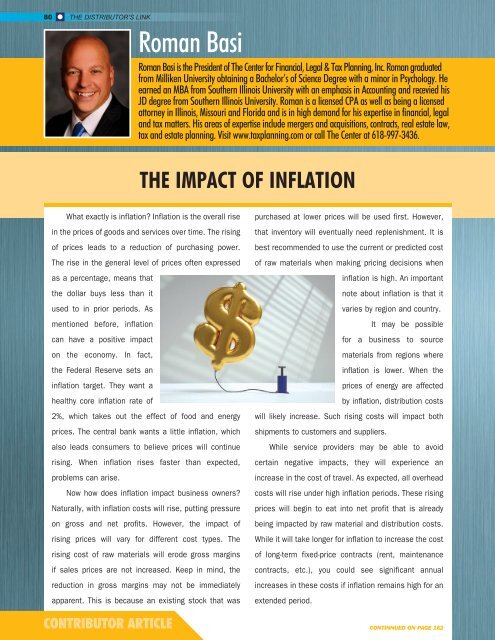FALL 2023
Distributor's Link Magazine Fall 2023 / Vol 46 No 4
Distributor's Link Magazine Fall 2023 / Vol 46 No 4
You also want an ePaper? Increase the reach of your titles
YUMPU automatically turns print PDFs into web optimized ePapers that Google loves.
80<br />
THE DISTRIBUTOR’S LINK<br />
Roman Basi<br />
Roman Basi is the President of The Center for Financial, Legal & Tax Planning, Inc. Roman graduated<br />
from Milliken University obtaining a Bachelor’s of Science Degree with a minor in Psychology. He<br />
earned an MBA from Southern Illinois University with an emphasis in Accounting and recevied his<br />
JD degree from Southern Illinois University. Roman is a licensed CPA as well as being a licensed<br />
attorney in Illinois, Missouri and Florida and is in high demand for his expertise in financial, legal<br />
and tax matters. His areas of expertise include mergers and acquisitions, contracts, real estate law,<br />
tax and estate planning. Visit www.taxplanning.com or call The Center at 618-997-3436.<br />
THE IMPACT OF INFLATION<br />
What exactly is inflation? Inflation is the overall rise<br />
in the prices of goods and services over time. The rising<br />
of prices leads to a reduction of purchasing power.<br />
The rise in the general level of prices often expressed<br />
as a percentage, means that<br />
the dollar buys less than it<br />
used to in prior periods. As<br />
mentioned before, inflation<br />
can have a positive impact<br />
on the economy. In fact,<br />
the Federal Reserve sets an<br />
inflation target. They want a<br />
healthy core inflation rate of<br />
2%, which takes out the effect of food and energy<br />
prices. The central bank wants a little inflation, which<br />
also leads consumers to believe prices will continue<br />
rising. When inflation rises faster than expected,<br />
problems can arise.<br />
Now how does inflation impact business owners?<br />
Naturally, with inflation costs will rise, putting pressure<br />
on gross and net profits. However, the impact of<br />
rising prices will vary for different cost types. The<br />
rising cost of raw materials will erode gross margins<br />
if sales prices are not increased. Keep in mind, the<br />
reduction in gross margins may not be immediately<br />
apparent. This is because an existing stock that was<br />
CONTRIBUTOR ARTICLE<br />
purchased at lower prices will be used first. However,<br />
that inventory will eventually need replenishment. It is<br />
best recommended to use the current or predicted cost<br />
of raw materials when making pricing decisions when<br />
inflation is high. An important<br />
note about inflation is that it<br />
varies by region and country.<br />
It may be possible<br />
for a business to source<br />
materials from regions where<br />
inflation is lower. When the<br />
prices of energy are affected<br />
by inflation, distribution costs<br />
will likely increase. Such rising costs will impact both<br />
shipments to customers and suppliers.<br />
While service providers may be able to avoid<br />
certain negative impacts, they will experience an<br />
increase in the cost of travel. As expected, all overhead<br />
costs will rise under high inflation periods. These rising<br />
prices will begin to eat into net profit that is already<br />
being impacted by raw material and distribution costs.<br />
While it will take longer for inflation to increase the cost<br />
of long-term fixed-price contracts (rent, maintenance<br />
contracts, etc.), you could see significant annual<br />
increases in these costs if inflation remains high for an<br />
extended period.<br />
CONTINNUED ON PAGE 162
















